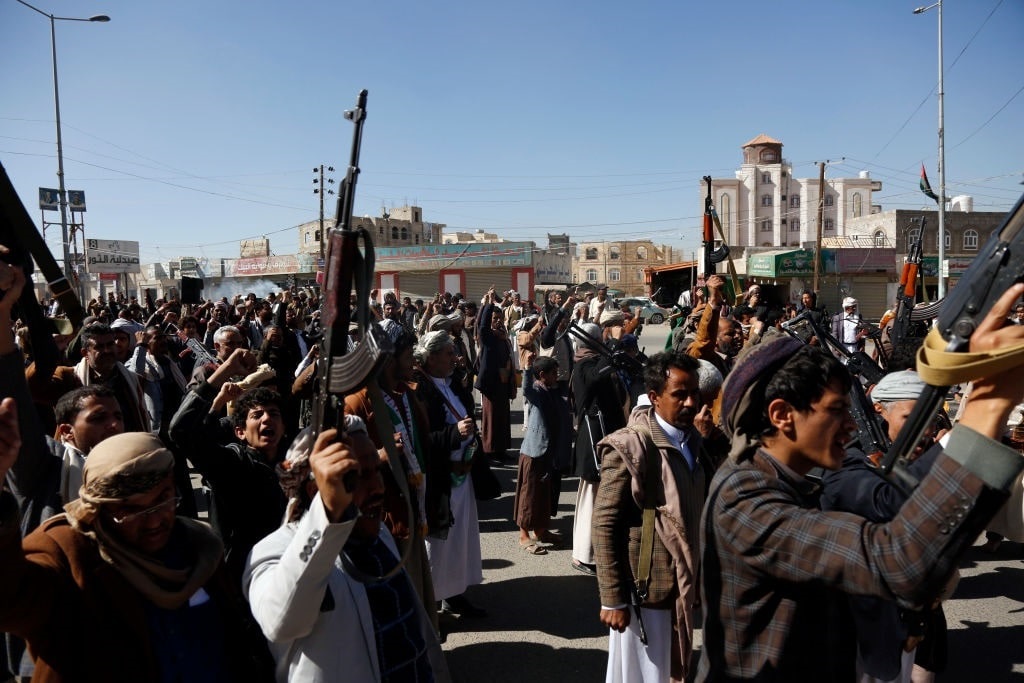A combined US and United Kingdom force took the fight to Iran-proxies where they live.
After more than 135 Iran proxy attacks on US forces in Iraq and Syria and 27 Iran-backed Houthi terrorist missile and drone attacks on commercial ships in the Red Sea, the US president did something to actually address the attacks. A combined US-UK air assault on the Iran-sponsored Yemeni Houthis – involving submarine-launched cruise missiles, US destroyers, British Typhoon fighter aircraft, and US jet fighters – struck over 60 individual targets at 16 locations in Yemen.
Iran-backed Rebel Houthis Got Their Comeuppance
Up to this point, retaliation by the US for persistent attacks on American military bases and outposts has been minimal. The US-UK response is welcomed by many in Congress and America’s armed forces who were beginning to believe the Biden administration would continue to sit on its thumbs, issuing warnings with no action. US Central Command posted on X that early in the morning on January 11, local time, multinational forces:
“Conducted joint strikes on Houthi targets to degrade their capability to continue their illegal and reckless attacks on US and international vessels and commercial shipping in the Red Sea. This multinational action targeted radar systems, air defense systems, and storage and launch sites for one way attack unmanned aerial systems, cruise missiles, and ballistic missiles.”

(Photo by Mohammed Hamoud/Getty Images)
In the US Central Command press statement, the explanation for why the US and its allies took this action was confusing, bordering on incomprehensible. The obvious intention was to persuade the Houthis as to the error of their ways. However, added to the explanation was this: “These strikes have no association with and are separate from Operation Prosperity Guardian, a defensive coalition of over 20 countries operating in the Red Sea, Bab al-Mandeb Strait, and Gulf of Aden.”
Now wait just a minute. The Houthis attacked Red Sea shipping. The US and its allies establish a task force to shadow and protect Red Sea merchant vessels, defending them from Houthi missile and drone attacks. Among the preferred ways of discouraging Houthis from attacking international shipping is to destroy their ability to attack international shipping. Isn’t that precisely what Operation Prosperity Guardian is supposed to be doing? Not to be trite, but isn’t the best defense a good offense? Why would US Central Command try to disassociate itself from the “best defense”? It smacks of feckless bureaucrat-think.
Meanwhile, over in Congress, two camps are emerging. One says kudos to the administration for finally attacking real terrorists. The other, however, is outraged that Congress wasn’t told before the attack. Among the outraged is Congresswoman Rashida Tlaib (D-MI), who seemingly never met an Islamic Jihadist she didn’t like. “POTUS is violating Article I of the Constitution by carrying out airstrikes in Yemen without congressional approval. The American people are tired of endless war,” she said.
Historical Biden Administration Critic Provides Faint Praise
On the other hand, Senator Lindsey Graham (R-SC) echoed the sentiments of many in Congress, agreeing with President Biden’s decision to attack Iran’s proxy in Yemen. “It’s long past time to let Iran know that we will hold them accountable for the actions of their proxies – in this case, the Houthi rebels. The only language radical Islamic groups understand is force … They (Biden’s team) must continue using military force in the face of aggression from Iran and their proxies,” Graham said in an X post.
Doing his “Mouse that Roared” impression, Houthi spokesperson Nasr al-Din Amir disagreed. “This is brutal aggression. They will undoubtedly pay its price, we will not waver in our stance to support the Palestinian people, regardless of the cost,” He told The Wall Street Journal. However, there has been no retaliation. Iran’s stooges in Yemen can’t say they weren’t warned. The Houthi terrorists were told numerous times to stop the attacks on international merchant shipping in the Red Sea and in the Strait of Bab al-Mandab. They ignored the warnings – and now they have paid the price.
Though bringing the violence to the Iran-supplied Houthi’s doorstep is a necessary action in discouraging bad behavior in the Gulf Region, the head of the yet snake lives. Iran is the instigator of the conflict in the Red Sea and, to date, has gotten away with it. Retribution for hostile, unacceptable actions by Iran’s proxies should be shared with the mullahs in Tehran. If that happened, there might be a change in Iran’s enthusiasm for supporting attacks on merchant vessels in the region and attacks on US military forces in Iraq and Syria. It has happened before. The Biden administration will have to address the central cause of all the Gulf Region conflict eventually.
The views expressed are those of the author and not of any other affiliation.

